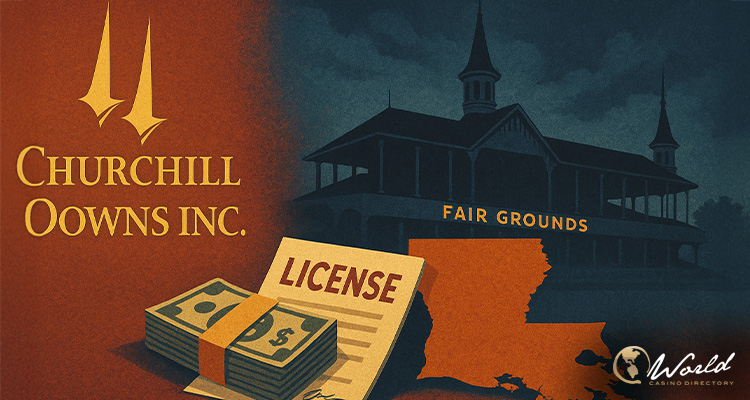Churchill Downs Inc. (CDI) has officially announced plans to withdraw from Louisiana’s historic Fair Grounds Race Course and its associated gaming operations, citing an untenable economic environment driven by recent legislative developments and a key Louisiana Supreme Court decision.
In a letter dated June 9 addressed to the Louisiana State Racing Commission (LSRC), CDI CEO Bill Carstanjen outlined the company’s intent to begin the process of surrendering its live racing and off-track betting licenses, as well as its permits for slot machines and video poker. This decision, Carstanjen emphasized, was made with reluctance but was deemed unavoidable due to what he described as a lack of support from Louisiana lawmakers.
“CDI is left with no choice but to request an appearance before the LSRC to begin the next steps for voluntarily surrendering the racing license held by the Fair Grounds,” Carstanjen wrote according to the Paulick Report, pointing to the legislature’s approval of measures he said were detrimental to the track’s business model.
The Final Straw: HHR Machines and Legislative Changes
The immediate catalyst for CDI’s decision was the Louisiana Supreme Court’s March ruling, which struck down the legal basis for Historical Horse Racing (HHR) machines—electronic betting terminals that had become a critical source of revenue for Fair Grounds’ 13 off-track betting locations. Churchill Downs had only installed the machines in 2022, aiming to modernize and boost the profitability of its Louisiana operations.
The ruling removed nearly half of the OTB revenue and about 74% of EBITDA from the books, leaving CDI in what it described as a financially unworkable position. “Operating under the current status quo is no longer an option,” attorney Ozair Shariff stated at a May LSRC meeting.
Adding to CDI’s frustration were two newly passed bills. One allows an increase in the number of video poker machines at truck stops and bars, while the other—the highly debated House Bill 547—authorizes fixed-odds betting on horse racing, a fundamental shift from the state’s traditional pari-mutuel wagering system.
Though the fixed-odds legislation includes a mechanism to channel 5% of proceeds into a purse fund for Louisiana horse racing, CDI argued that the bill threatens to divert significant revenue from racetracks and OTBs to online sportsbooks and new market entrants.
Local Opposition and Fallout
Despite repeated efforts to engage legislators before the session’s June 12 adjournment, CDI reported being met with apathy and resistance. “Our efforts to engage elected officials have not led to meaningful discussions and, confoundingly, CDI’s efforts have been met with a combination of reluctance, indifference, apathy, and even opposition,” Carstanjen noted in the letter.
Some state leaders, however, expressed outright defiance toward CDI’s demands. Louie Roussel III, a former Fair Grounds owner and a vocal ally of Governor Jeff Landry, spoke bluntly at a May commission meeting. “Do not allow these people to do this,” he told commissioners. “If they tell you they don’t want to race, fine them $50,000 or $100,000 a day for every day they don’t race. There will be no state subsidy for this racetrack. None.”
Despite this opposition, CDI remained firm in its assessment that ongoing operations were unsustainable without HHR revenue and legislative compromise.
A Blow to Louisiana Racing and the New Orleans Economy
The closure of Fair Grounds, one of the oldest racetracks in the U.S. and a key player in Louisiana’s Thoroughbred industry, would be a major setback for the local economy and racing community. “Closing one of the nation’s oldest racetracks, and the most important track in Louisiana, will be a devastating blow to Louisiana’s equine industry and the New Orleans economy,” Carstanjen warned.
Beyond its historical significance, Fair Grounds hosts critical winter and spring races that contribute to the national Kentucky Derby prep circuit, attracting horsemen from across the country. Its departure could leave a void in the local racing calendar and significantly impact breeders, trainers, and support staff throughout the state.
Churchill Downs has a history of exiting markets following disputes with local governments, most notably with its 2021 closure and subsequent sale of Arlington Park in Illinois after a failed attempt to alter tax arrangements for a proposed casino at the site.
What’s Next for Fair Grounds?
The Louisiana State Racing Commission has scheduled a meeting for June 15 to review the situation and hear from CDI representatives. According to Carstanjen, CDI officials will attend to outline “the timeline and next steps” for the surrender of their licenses.
As of now, the future of Fair Grounds Race Course remains uncertain. While some believe CDI could still pivot by replacing HHR machines with legal video poker terminals or seeking parish-level approval for HHR under the new legal landscape, the company has not publicly entertained these alternatives.
Unless a last-minute agreement or policy shift occurs, Louisiana appears set to lose one of its most iconic racing venues, marking a pivotal moment for the state’s equine industry and its legislative role in shaping gambling policy.



